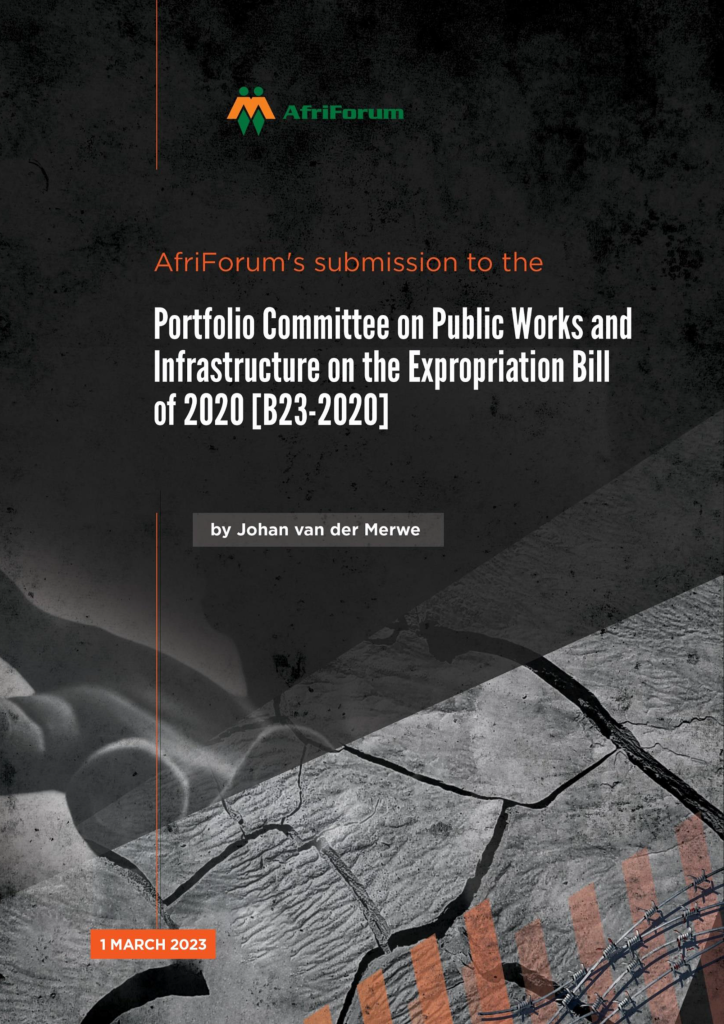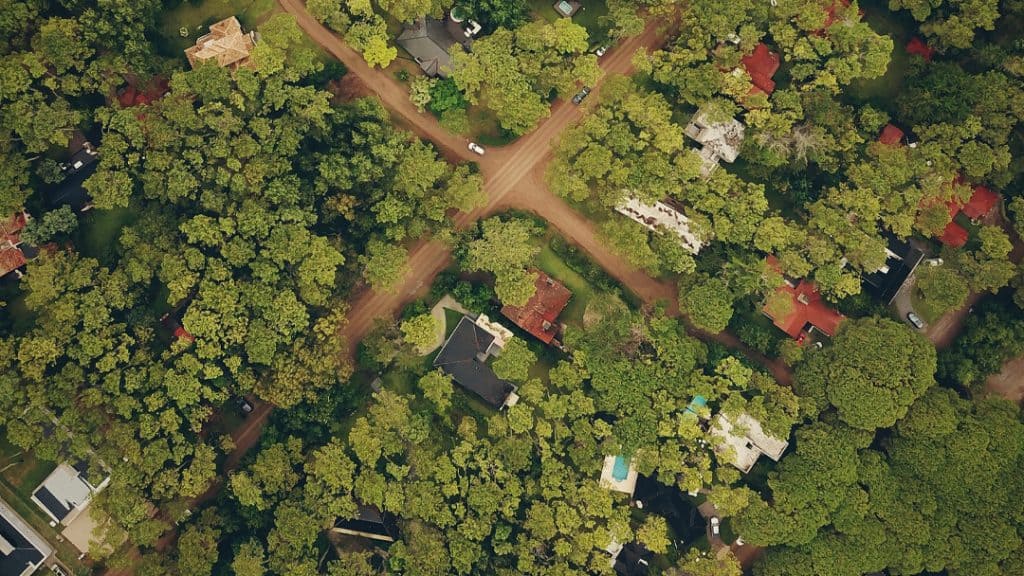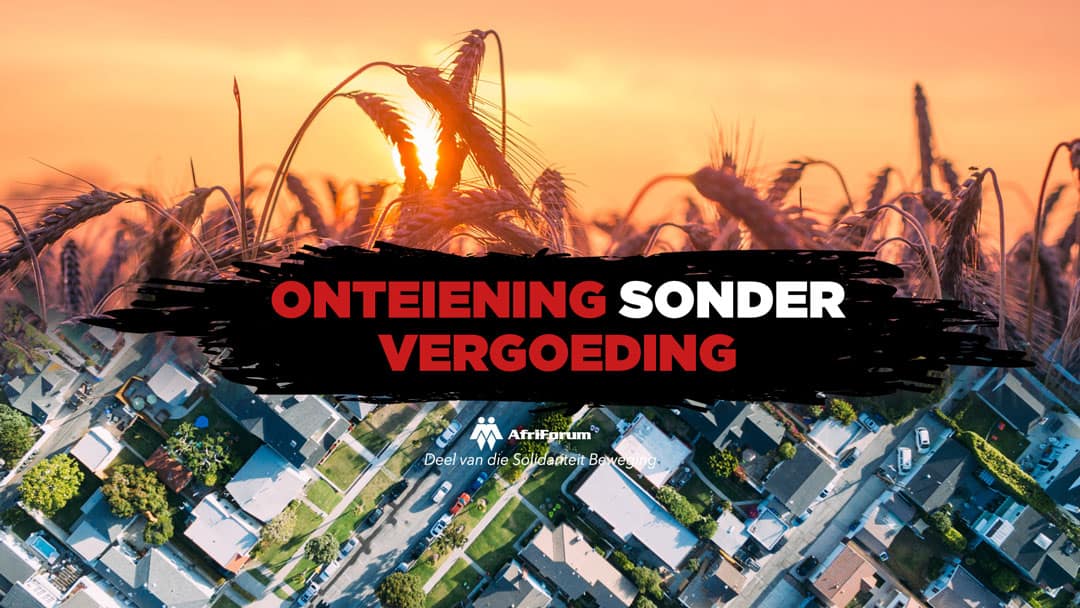
STOP
EXPROPRIATION
without compensation!
Expropriation Bill 2020
The ANC’s attempts to allow for expropriation without compensation by changing the Constitution were thwarted in parliament last year. However, the ANC maintains that it will make expropriation without compensation (which is nothing more than state theft of property) a reality despite this setback. The fight for private property in South Africa is therefore not yet over.
One of the alternative ways that the ANC wants to employ to allow it to expropriate property without compensation is through the Expropriation Bill B 23-2020, which was published in the Government Gazette in October 2020. Since then, it has become part of the parliamentary process. According to the Bill, expropriation is defined as the “compulsory acquisition of property by an expropriating authority”, which means that any state organ or department may expropriate private property. The Bill enables the expropriation of any property, and it is therefore not limited to land, but also includes all movable property (for example your possessions) as well as non-movable property (for example your building, house and infrastructure). This Bill does not flow from the process to amend article 25 of the Constitution to enable expropriation without compensation; it is an attempt to pave a new way for government to expropriate private property within the current framework of article 25 of the Constitution.
AfriForum submitted written commentary against the Expropriation Bill to the portfolio committee for public works and infrastructure in 2021, as well as a verbal presentation against it.
The portfolio committee will vote on the Expropriation Bill on 14 September 2022. Oppose this Bill together with AfriForum because it endangers private property rights. Please complete the form so that AfriForum can send a letter to the portfolio committee on your behalf.
The government’s actions has consequences.
AfriForum is requesting the South African government to urgently file an amendment to the Expropriation Bill.
Stop expropriation without compensation.
America is threatening financial sanctions against South Africa.
Ordinary citizens can not be punished for the government’s actions.
The government’s actions has consequences. STOP expropriation without compensation.
AfriForum is requesting the South African government to urgently file an amendment to the Expropriation Bill.
Stop expropriation without compensation.
America is threatening financial sanctions against South Africa.
Ordinary citizens can not be punished for the government’s actions.
THE FIGHT FOR PRIVATE PROPERTY RIGHTS AND OPPOSITION TO EXPROPRIATION WITHOUT COMPENSATION
AfriForum is preparing their legal documents! Stop expropriation without compensation. Join the fight with AfriForum and add your name here:
In March 2023 AfriForum submitted its written commentary against the Expropriation Bill to the National Council of Provinces. As part of this phase, the Gauteng Legislature’s Committee on Infrastructure Development and Property Management created a separate opportunity for the public to submit commentary in a provincial context. AfriForum also submitted written commentary here and participated in the public hearings.
Click on this link to watch AfriForum’s submission against the Expropriation Bill before the Gauteng Legislature’s Portfolio Committee on Infrastructure Development and Property Management:
In September 2023 AfriForum continued its fight against the Expropriation Bill with an oral submission before the Select Committee on Transport, Public Service and Administration, Public Works and Infrastructure in Cape Town. Ernst van Zyl, AfriForum’s Head of Public Relations, submitted a list of politically uncomfortable facts on land and land reform in South Africa to the Committee, as well as a list of solutions that AfriForum proposes. Watch the submission here:
The National Council of Provinces passed the Expropriation Bill in March 2024. It was then referred back to the National Council of Provinces, who also passed the Bill. The next and final step is to send it to the Office of the President for assent. AfriForum directed a letter to the President through its lawyers, requesting that the Expropriation Bill be rereferred back to the National Assembly for reconsideration of its constitutionality.
If the President assents to the Bill, AfriForum will announce its next steps to protect private property. AfriForum will also be the first organisation to take the government to court if it starts targeting property for expropriation without compensation.
April 2022
January 2022
December 2021
April 2022
January 2022
December 2021
The Concept Bill on Expropriation without Compensation was recently published for public comment. If this Bill is approved into law, it would mean that the state will have the power to expropriate land in South Africa without compensation. There are fundamental flaws in the Bill that seriously threaten property rights.
AfriForum has therefore already launched a comprehensive campaign against expropriation without compensation on local, national and international level. Read more about these actions below.




